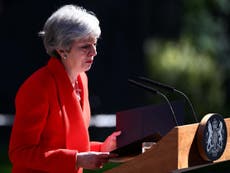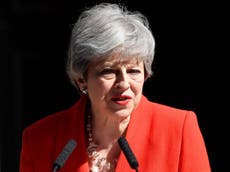The scramble to be next Tory leader is a race to be captain of a flailing, battered ship
Underlying this leadership battle is a slower, more insidious threat to the Conservative Party

British politics has been simmering up to this moment for several weeks now. Theresa May’s authority in parliament and the Conservative Party has dwindled and eager leadership hopefuls have been setting out their stall ready for the starting gun to be fired. The question was only ever when, rather than if, the prime minister would go. Perhaps now the reality will set in for potential successors.
With the state of the Conservative Party at present and Britain’s departure from the European Union still to be tackled, it’s a wonder that quite so many Conservative MPs are willing to throw their hat into the ring.
We often expect our MPs to be power hungry, but few would clamour for a premiership if they knew that their legacy was very likely to be like that of Theresa May.
Polls show that the party is on course for its worst electoral defeat ever in the European elections with a sizeable majority of Conservative voters plumping for Nigel Farage’s Brexit Party due to their dissatisfaction with the government’s handling of Brexit.
Within the Commons, the defections of several Conservative MPs (Sarah Wollaston and Heidi Allen to Change UK, and Nick Boles’ decision to become an independent) makes the government’s minority position even worse, forcing them to be even more reliant on the DUP, a party which is yet to support the government’s Brexit deal in the division lobbies and who were this week still shouting about the "fatal flaws" in the (now postponed) Brexit legislation.
In her statement today, May said that the time had now come for a new leader to “lead the effort” to negotiate a deal and stressed the importance of finding consensus. But whoever that next leader will have an incredibly tough job on their hands.
If they have any hope of passing a deal through the Commons, they’ll need to appeal to both the hard Brexiteer and to the softer Brexiteer wings of the party, while at the same time bringing the DUP back on board and engaging with opposition parties on the other side of the House.
The nature of the Conservative party leadership election process poses another dilemma. Candidates, broadly, need to set out a magnanimous, “one nation Tory” platform from the start to attract enough MP votes to make it through to the final two, where they will likely have to emphatically reveal their harder Brexit credentials to win the top job in a membership vote. Boris Johnson has momentum; the only real chance of him failing at this stage is if he fails to pull off the first part of that trick.
Alongside the stress on “honouring” the referendum result, the new leader – Boris or whoever – will need to be looking over their shoulder for the Brexit Party.
Current general election polling puts Farage’s party second behind Labour, pushing the Conservatives into third place. To avoid what seems like a semi-permanent split in the party vote and the almost certain electoral annihilation which comes with that, the next leader will need to put the Brexit issue to bed very quickly.
Any further dithering will serve only to highlight the need for a general election as the only means to solve the impasse. That might send the next Tory leader heading towards a “Farageist” pact. The electoral implications of that could be dramatic, if a more progressive opposition gets its house in order.
And underlying all of this is a slower, more insidious threat to the Conservative Party. The new leader may end up locked in the charade of traipsing back and forth to Brussels while beating the drum for a reckless hard Brexit, and all the while the demographic shift which has made the Tories anathema to large chunks of society will continue to chip away at what is considered a bedrock of the British electoral landscape.
Louise Thompson is a senior lecturer in politics at the University of Manchester






Join our commenting forum
Join thought-provoking conversations, follow other Independent readers and see their replies
Comments